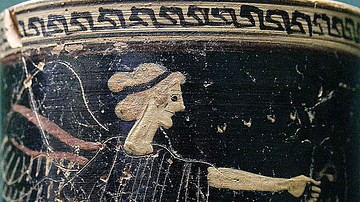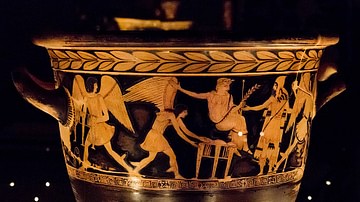Search
Search Results

Definition
Electra by Euripides
Electra is a Greek tragedy written by the playwright Euripides, c. 420 BCE. It retells the classic myth concerning the plotting of Electra and her brother Orestes to kill their mother and her lover. This version of the story should not be...

Definition
Electra by Sophocles
Electra is a play written by the 5th-century BCE Greek tragedian Sophocles. Similar to Aeschylus' Libation Bearers, Electra focuses on the return of Electra's brother Orestes from exile and the plot to murder their mother. Years earlier...

Definition
Libation Bearers
The play Libation Bearers was written by one of the greatest of all Greek tragedians Aeschylus (c. 525-455 BCE). Winning first prize at the Dionysia competition in 458 BCE, Libation Bearers was the second play in the trilogy The Oresteia...

Image
Orestes & Electra
A marble representation of Orestes and Electra, the children of Agamemnon from Greek mythology. They stand before the tomb of their father and are in mourning as indicated by the postures and short hair of Electra. A stele behind Orestes...

Definition
Euripides
Euripides (c. 484-407 BCE) was one of the greatest authors of Greek tragedy. In 5th century BCE Athens his classic works such as Medeia cemented his reputation for clever dialogues, fine choral lyrics and a gritty realism in both his text...

Definition
Sophocles
Sophocles of Kolōnos (c. 496 - c. 406 BCE) was one of the most famous and celebrated writers of tragedy plays in ancient Greece and his surviving works, written throughout the 5th century BCE, include such classics as Oedipus Rex, Antigone...

Definition
Ancient Greek Tragedy
Greek tragedy was a popular and influential form of drama performed in theatres across ancient Greece from the late 6th century BCE. The most famous playwrights of the genre were Aeschylus, Sophocles, and Euripides and many of their works...

Definition
Iris
Iris is the goddess of rainbows and an important messenger between the gods and humans in Greek mythology. She was most commonly portrayed as the personal messenger of Hera. Iris was the daughter of the Titans Thaumas and Electra and the...

Definition
Harpy
A harpy, also known as a harpyia (pl. harpyiai), is a part-bird, part-woman monster in Greek mythology. Known as the 'Hounds of Zeus,' they were the personification of storm winds and were under the command of Zeus, who would send them out...

Article
Hesiod on the Birth of the Gods
The Greek poet Hesiod (c. 700 BCE) is most famous for his works Theogony and Works and Days. In this passage from Theogony, Hesiod relates the birth of the gods from cosmic Chaos and follows the lineage through the great Zeus, King of the...